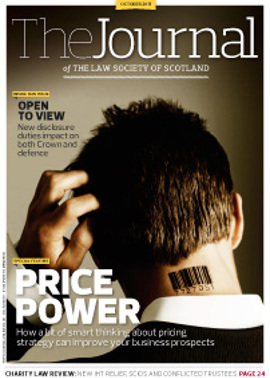"Storm not over yet", Cunningham tells conference

The many challenges and opportunities facing Scottish solicitors in the years ahead were spelled out at the Society’s "Law in Scotland – One Profession" conference in Glasgow on 6 September. Delegates were warned that more savings would have to be made in the justice system, and the Cadder case would continue to have significant implications for the Scottish legal profession.
Yet the Government minister who warned that "The storm weathered by the profession is not yet over", also highlighted opportunities to come – Lord Gill’s far-reaching reforms to the civil courts, the further promotion of Scotland as a forum of choice for alternative dispute resolution, and the introduction of alternative business structures (ABS).
The conference, which was attended by around 200 delegates was opened by the Society’s President, Cameron Ritchie. He highlighted the common challenges facing an increasingly diverse profession. He said: “There remains much more that unites us than divides us, and even with our modern diverse profession, we retain common interests, common challenges and common goals.” He highlighted the example of a united profession working with the Government and others to ensure the introduction of a workable police station duty scheme.
"Difficult choices"
The Minister for Community Safety and Legal Affairs, Roseanna Cunningham, gave the first keynote speech. She said the Scottish Government was bringing forward the most radical reform of the country’s courts and tribunals in a century.
However, more savings would have to be made to meet huge challenges, and “stark figures” about the justice system showed the scope for improvement, she added. For instance, it was estimated that solicitors currently travelled about 5,000,000 miles a year to see clients when videoconferencing might save time and cost.
Earlier in the day, Audit Scotland had reported that significant inefficiencies in the justice system resulted in delays, repeated processes and unnecessary costs, many of which could be avoided.
Focusing on legal aid and access to justice issues, including changes to summary criminal fees and travel fees, Ms Cunningham said difficult decisions had already been taken, but added: “We will need to make more savings as we go forward. Legal services form a unique and valuable part of both Scotland’s private sector and civil fabric. Our legal profession has had a tough time over the last few years, with firms having to make difficult choices to weather a storm which isn’t over yet.”
But she added that, despite a challenging economic climate, “there is a real opportunity for you to work together – as one profession – in collaboration with the Scottish Government, to come up with new solutions which benefit the Scottish justice system, and Scottish society as a whole”.
Carloway "end game"
In the session on access to justice in an age of austerity, Lord Carloway gave an update on his review of Scots law and practice in relation to the detention and questioning of suspects in a criminal investigation, which was set up following the Cadder case. He told delegates that the effects of Cadder must not be underestimated.
He said: “The review is now in the end game. It is pulling all the threads together to weave the tapestry of the final report, which will be completed this autumn. The implications of Cadder for the profession, or at least the part of it engaged in criminal work, have been, and are likely to continue to be, significant.”
He warned that the “sons and grandsons” of Cadder would also have implications for the profession. Lord Carloway also highlighted the Turkish case of Dayanan, which could lead to the right of access to a lawyer as soon as a suspect is detained, even before questioning. He added: “Part of the trial is being moved from courtroom, where the judge exists to see that all is well and within the law, to the police station where that obligation is being thrust upon the solicitor, who has no immediate recourse to judicial intervention.”
Full implementation of the implications of Cadder, its “offspring” and Dayanan would cost a significant amount of money, he added, with solicitors potentially expected to provide advice on a 24-hour basis and courts possibly opening at weekends. He said: “There are of course very significant problems centred upon the financing of such a system. These present the Government, the profession and the public at large with real difficulties in an age of austerity.”
Communications
One of the other keynote speakers, barrister Stephen Mason, posed the question: are lawyers really ready for the information age? He said key IT security threats facing lawyers included hacking and malicious software. There were some risks in using handheld devices, wi-fi and USB drives, he added.
Solcitors also have to consider issues such as client confidentiality, data encryption and digital signatures, while meeting the challenges of maintaining a website and managing internet use. He commented: “It’s all a matter of scale – from small to large, you have to assess your risks.”
The other keynote speaker, Hamish Taylor, founder of the Skills Exchange Network, a management and leadership development organisation, highlighted the benefits of learning from the skills and experiences of other professions and sectors.
In a lively presentation, he stressed the importance of getting communication right – for staff and customers – as well as offering superior products and services. He said: “If you only look at other law firms, you are only ever going to be equal to them. If you really want a breakthrough, you have to look outside your current environment.”
ABS timetable
In a presentation on regulatory changes, the Society’s Director of Regulation, Philip Yelland, told delegates that the timetable for implementation of ABSs was slipping. The Scottish Government had made it known that it was taking longer than expected to produce its regulations and guidance for approved regulators, which would perhaps not be finalised until next January or February. The result was that the first ABSs – licensed providers of legal services – were unlikely to emerge until late summer next year.
Society chief executive Lorna Jack said the conference programme had been more varied than ever before, to suit all sectors of the profession. She added: “It is hugely positive that solicitors from across the profession can come together in this way.”
In this issue
- Frank Maguire: an appreciation
- The Society's new corporate plan
- Budgeting for 2011-12
- Shooting the carrier
- Future of adventure activities licensing
- A year in mortgage recoveries, and oh what a year!
- A clearer lending code
- Land of myths and (occasional) legends?
- Crofting briefing
- Reading for pleasure
- Opinion
- Book reviews
- Council profile
- President's column
- Foreign and different
- The price is right
- Into his stride
- Do not cross
- All aboard the Land Register
- As easy as 10%?
- Definition under strain
- Another round
- Honest and reasonable?
- Demolition derby 2
- From the other side
- In-house Lawyers Group under review
- Necessary formalities
- Practical limitations
- Remember, remember... the first of November
- "Storm not over yet", Cunningham tells conference
- Constitution: new proposals for AGM
- From the Brussels office
- Screen test
- Ask Ash
- SYLA appeals for advisers
- Full schedule






